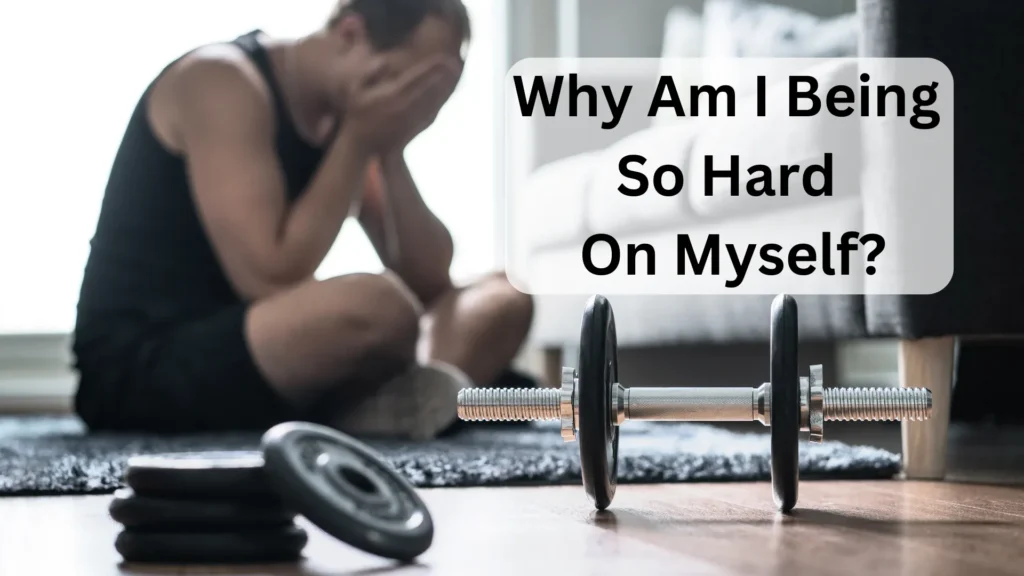
Why am I being so hard on myself?
This is a question that many people tend to ask themselves, especially those who are in the high performance realm. Whether it’s sports or something else like the performing arts, business, or even personal health and relationships.
I recently read some articles on this topic and I found that I disagreed with most of what has been written.
Many of the articles are talking about the pathologies of why you’re beating yourself up, such as abuse or bad parenting or perfectionism. They frame it in this unnatural, unhelpful way that honestly just makes me feel worse when I catch myself being critical.
But I want to ask, have you ever met somebody that didn’t beat themself up?
There is, if you want to call it a “pathological” or more problematic level of self criticism. But I’m scaling this discussion back to the idea of self criticism in any capacity.
And what I want to be sure you know is this: self-criticism is just a normal response to our failure to meet the standard we desire.
Everybody does it, sometimes to a degree that it really hurts and sometimes to a degree that doesn’t hurt at all and might even help.
Self-criticism is not something that is automatically bad, and if you do it, it doesn’t mean that there is something wrong with you.
The problem isn’t the presence of self-criticism but how we relate to it. Because if we start fighting our internal dialogue we are going to get stuck. We can’t fight our internal thoughts and do life at the same time. For example, if I am focused on how badly I messed up on the last athletic play, I don’t have any attention given to the play I am in right now!
But before I go into this any more, let me backup and answer your question, “Why am I being so hard on myself?”
It’s because you care!
Whatever it is that you’re criticizing yourself about, you care about it greatly, don’t you?
And as a result of caring about it, this part of your mind gets a little bit activated and says we want to do everything we can to be sure that it (the best performance or result) happens.
Because if it doesn’t, we’re going to be upset.
And so there’s a bit of self motivation in there that comes out in maybe a strong, insulting way.
No, it’s not always helpful. It can often be a distraction. And at the same time notice that there is this drive or motivation or energy to get it right that’s behind it.
Sometimes being hard on ourselves gives us the kick in the pants that we need.
I had to do this myself recently in the gym (you can watch what happened here).
Notice the heart I said those things with. I said it with encouragement from a place of belief in myself because I knew I had more to give.
So being hard on yourself isn’t necessarily a good or bad thing. More on that in a moment.
What being hard on yourself is, is normal. It comes from a place of caring. So when you find yourself being critical of yourself or your performance, recognize that it’s just reinforcing the idea that this stuff matters to you in a big way.
That’s why we’re not going to be able to get you to stop doing it.
To try to fight it and stop doing it will only lead to more frustration, failure and criticism. All the while you will be so focused on your inner critic that your attention will be distracted from living your life.
You can’t play your sport, be present with your partner, or hug your kids, and fight your inner critic at the same time. You can’t do two things at once.
So in this article, we will learn how to charge our relationship with this critical self-talk so that your performance can be enhanced, even when you are hard on yourself.

So if I can’t stop criticizing myself, what do I do instead?
Step one is noticing.
If you’re reading this article, that’s great.
That means you’ve noticed that you’re beating yourself up.
Noticing is that perspective that you can have, where you can jump outside of your thoughts and feelings and watch what you’re thinking and feeling. Much like how a friend might observe it.
It is in this objective, neutral space that you want to start.
This alone can be a first step challenge. It is hard to jump out of the content of what we are thinking. Be encouraged, however, as this skill can be developed. Mindfulness, for example, is one popular way.
And this is essential because if you’re not able to notice when you are being too critical, then you can’t do anything about it.
The next step is to notice what particular phrases you keep saying to yourself.
We usually have our own flavor. Maybe there’s a special insulting name that you like to call yourself.
Ask, “What impact does that phrase have on me? Is it helpful or hurtful?”
If it’s helpful, such as calling myself a wimp that led to more focus and energy in the example above, then just go with it!
When it’s not helpful, however, the question to ask yourself is, “Why is my mind saying that? What’s it trying to accomplish or protect me from?”
Now, your first response is probably going to be. “Well, I called myself _____ because it’s true! That’s what I am. I’m stupid. I’m lazy. I’m this, I’m that.”
Well, no … you’re not. That’s a perfect example of what it means to be too attached to our thoughts. When we just believe what we automatically think.
The reality is that name calling is an overgeneralization and a label that isn’t accurate.
If I say “I am bad,” does that mean I have never done good things? If I believe myself to be “good,” does that mean I’ve never done a bad thing? Of course not.
While these generalizations are never completely accurate, they do point to what we care deeply about each time.
They let us know there is a standard we care about being.
So ask yourself, “What is this self-criticism about?” and you will often found it is about a desire to get better.
Like if you are calling yourself lazy, you might notice this and reflect, “Well, I guess this means I care about my productivity. It’s not about what I actually am, it’s about what I want to be.”
And then say: “Well then, what can I do about it?”
You should respond with a specific behavior that reflects the value you just expressed.
For example, “Put down my phone and refocus on the project” or “turn off the TV, get off the couch, and go for that run.”
Keep the emotion out of it. Don’t get caught up in the labels. Take positive action and move in the direction of who you want to be.
The Danger of Labels
We tend to change our behaviors to fit our identity!
Our mind doesn’t like incoherence, when my beliefs and actions contradict each other.
Ideally we would modify our beliefs to match the reality of our actions, but the opposite tends to be true. We will go so far as to unconsciously sabotage our own behaviors to match our beliefs.
I remember one athlete who was told at a young age that he was a “loser and would never win anything.” He progressed far in his sport, competing at world championships. Unfortunately each time he was in contention to win he would make a critical mistake that would cost him a podium finish.
So be careful about holding onto your critical labels so tightly. You aren’t what you think.
Instead, remember that the function of the criticism is simply to highlight you are in a space you care about. A place you want to be better in.
Then ask if being hard on yourself is working to help you be that person.
If it is, then carry on with what you’re doing.
If it isn’t, slow down. Notice what your head is saying. Get in touch with what it’s trying to help you do or be. Focus on action over the content of what your mind is spitting out.
Pay attention here.
It doesn’t matter if it is true or false, positive or negative. There isn’t something you should or shouldn’t say. It all comes down to workability. Does being hard on yourself move you forward or hold you back. Invest only in the words that move you forward. Let the hurtful criticism operate in the background like a song you don’t like on the radio.
You can tune in and out to your self-talk just like a radio. When a song you like comes on and is helpful, listen and sing along with it. When you don’t like the song, pay attention to other things. Notice the radio doesn’t have to be turned off for this to work.
Why doesn’t the truth matter? Let me illustrate with an example.
Let’s say the reality is you are at the bottom of the roster, barely making your team. Just about everyone else on the team is in fact better than you. You might say being hard on yourself and saying, “I suck” is true. And by comparison, I can’t really argue with you.
Or rather we could argue. We could come up with a whole bunch of reasons why you do suck. You barely made the team. You made 3 errors last game. You are last to get called off the bench. The coach hardly plays you.
We could counter and argue that the team you are on is a very competitive team in a competitive league. Compared to the average high school athlete, for example, you are amazing. You’ve won championships before and have trophies illustrating success all over your room.
In the end, what does all of this evaluation matter?
It doesn’t!
Whether you suck or not is irrelevant.
What matters is that you give full effort in practice and games and develop your skills. If thinking you suck helps you do that, use it. If it holds you back, let it go.
The important thing is you focus on the moment and take action to get better.

Next Steps
I realize none of what I say above is natural or what pop psychology is teaching.
Good! It’s time we start being more effective in how we relate to our internal dialogue.
If you are hard on yourself (or not hard enough on yourself) and you want to be more effective in taking action towards your goals, I have the place for you.
I created the Success Stories Community to help you overcome these internal obstacles so you can be more intentional and consistent in your performance on the athletic field, in the classroom, at work, and in your health and relationships.
Join us here, and let’s overcome your obstacles to excellence together.



